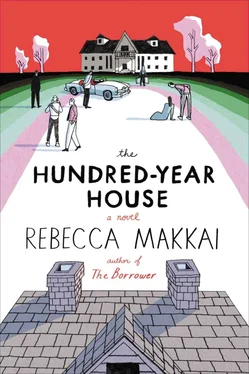A letter from her college friend Harriet, tentative, curious if Grace would come home soon. Harriet had been one of the very few at the wedding, and — of those — one of the only ones not to pull Grace aside, to ask if she was sure .
She wouldn’t write back. What was there to say?
By dinnertime, the Darrin was gone again, and a hard knot that she hadn’t realized was in her stomach melted away. She’d have dinner alone, and she was getting rather used to it. She brought down Vanity Fair —Captain Osborne had just asked Becky to run away with him — and sat at the table.
After a long time, she heard a wail from the kitchen, a cry that wasn’t sudden or surprised, more like part of an ongoing tantrum. There was talking — several voices, all female — and then a low, constant sob. Grace considered heading back there, but it was on principle that she didn’t. Dinner was fourteen minutes late. The cook could apologize when she emerged.
The crying got louder before it stopped altogether. When Rosamund walked out, she didn’t have a single dish in her hands. Her face was red, but Grace could tell immediately she hadn’t been the one crying. She’d known all along, really, that it was Amy. Rosamund stood inside the door, her arms folded across her waist, and she said, “I can’t do it any longer. I’d gladly stay on for you, but I won’t work for him . I refuse.”
“He’s not even here tonight,” Grace said. “He took the Darrin out again. And you haven’t served him a meal in five days.”
“Listen.” She had lowered her voice, though she didn’t come any closer to Grace. Why didn’t she talk like a servant? None of these American ones did. “I apologize for my language. But, ma’am — he’s raped her.” Her nostrils flared and she put her hand to her earlobe, but she kept her eyes straight on Grace. All Grace could think of was throwing a plate right at Rosamund’s mouth until she stopped talking, until she vanished from the earth. “She’s been in there two hours, and she won’t stop to breathe. Beatrice is giving her tea. He took her into the Longhouse and he forced himself on her.”
“Well,” Grace said. And she spoke on instinct, or at least she said what she imagined her mother might say, even though she didn’t know what that would be till she heard it come out of her mouth. “I very much doubt that’s true. If you must know, Amy lies and steals, and she’s quite in love with George. He’s had his way with her, I do know that, I’m not blind. But I’ve seen her. She was quite willing. I’m afraid she’s played you for a fool.”
“Now why would she do that?”
Grace stood from the table and left her chair out, and pushed past the cook into the kitchen. Amy was perfectly well clothed, her dress not even ripped or stained, except that someone had draped a kitchen towel around her shoulders. She and Beatrice sat side by side on chairs, Beatrice still in her gardening boots. Grace wanted to stick all three women into the Frigidaire and lock the door.
“Amy,” she said. “Are you with child?”
Amy looked up with red, swollen little eyes. She choked out a whisper: “No, ma’am. I don’t think the timing — no.”
“Then I don’t understand the change. It’s all been fine with you up till now. Or perhaps it’s because I caught you stealing. The thing of it, Amy, is that you aren’t going to wedge us apart. If I leave George, or if George leaves me, it won’t be because of some thieving girl.”
Amy screamed into her hands and rocked forward, and Beatrice bent over her and rubbed her back. Beatrice said, “I found her outside the Longhouse.”
“But you didn’t hear her when she was in the Longhouse, did you? She must not have screamed very loudly. Beatrice, I haven’t invited you into my kitchen.”
Beatrice looked shocked, but then, as Grace had known she would, she nodded and walked slowly to the back door. She said, “Amy, I’ll be in the garden cottage.”
There was soup boiling on the stove, getting too thick, prob-ably.
Grace said, “Amy, are you quitting your job?”
“No, ma’am.”
“ I’m the one quitting,” Rosamund said. “And, forgive me, you ought to quit too, ma’am. You ought to leave this house and get back to Canada before he slices you to bits. And Amy ought to leave, and Beatrice ought to leave, and anyone with any sense should get out of here. But as it seems I’m the only one with a backbone, I’ll be leaving alone tonight.” She whipped her apron off, as if more drama were necessary, and left it behind her on the counter.
She was gone, and it was just Grace and Amy, alone in the kitchen.
Grace said, “You’ll have to serve the soup then.”
“Yes.”
She didn’t know what to think. How could she possibly know what to think? But she did have one clear and horrible realization, as she sat back at the dining table. The drama she had sought in George, the lust and fire, would never involve her anymore, because she was the one married to him. He might gash her face, but he wouldn’t ravish her, wouldn’t focus his whole being on her seduction. The drama would always be, from now on, about other women.
Amy brought her the soup, clattering the bowl on the saucer and hyperventilating the whole way. Cream of squash, cooked to a gelatinous mess.
Grace wanted to sob until she flowed to the floor and out of the house and into Lake Michigan.
She said, “Amy, I’ll want more water.”
And when Amy brought her more water, she sent her back for another roll.
And when she brought the roll, she told her to take the soup away because it wasn’t any good.
—
The next day there was a telegram from Toronto: FATHER GRAVELY ILL. TWO OR THREE WEEKS LEFT PLEASE COME HOME.
She wouldn’t do it. She couldn’t face him now. He’d see right through everything, he’d see that she knew about his degeneracy, and he’d see that he’d been right about George, and she’d break down screaming and she’d tear her clothes and move back to Toronto forever. And do what? And live how? And George would follow her there, and ruin everything for everyone, for her brother and her mother, and the whole city would see her as the girl who came home broken, rather than the girl who ran off for love.
And then she sat and cried all afternoon. Because if it was true that her father was dying, and if George was right that no one would ever visit her here, and if she was too stubborn to go home, then she’d never see any of them again.
—
Three days later, she went to the coach house when Amy was busy in the kitchen. Amy was cooking everything now, though Grace knew Beatrice snuck in there, whenever she could, to help. The food was dreadful: browned meat covered in sour cream and baked for an eternity; chopped celery covered in cheese and baked; sliced apples for dessert, smothered in a mash of cream cheese and powdered sugar. Grace wanted her gone, wanted her back wherever she’d come from, but she couldn’t bring herself to do it, not least because Amy might go to the police then, might say enough that word would spread, as word always spreads, and word could reach Canada. It could reach her father on his deathbed.
But she did have a plan, and having one made her feel better. It came together just when the greenhouse plans came together, as if she were turning out, after all, to be the architect of her own life.
She found Max in the garage and asked him to walk with her to see the digging. “I want your opinion,” she said, though it made no sense why someone would have any particular opinion about a hole in the ground. They walked to the far end of the house and stared into the rectangular hollow for the greenhouse foundation. Ludo and two Negroes and a red-haired man all stood in it, poking around the edges of the steps that currently led down from the door of the solarium. They’d have to pull out those steps like decayed teeth, and the concrete floor of the greenhouse would come even with the door. Max greeted the men and looked without great interest at their progress, and when she asked if she might speak to him on the terrace, he nodded and followed her around the corner. They sat looking out at the fountain and the paths that spread from it like rays, and the fire pile growing tall back by the woods, and the Longhouse, and the little studio behind that and, on the far side, the cottage studio that used to house composers and was now the shed for Ludo and Beatrice. Next to the cottage, Beatrice’s vegetable garden was finished and brown.
Читать дальше












